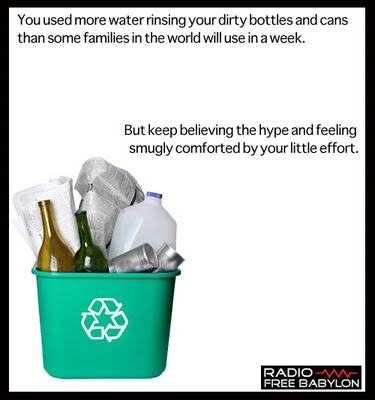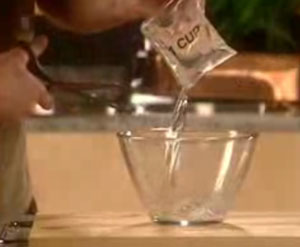I Feel Good, I Knew That I Would, Now
Via the post, “Don’t Make That Indian Cry” at wheresmyjetpack.blogspot.com,
Do I recycle? Yes, almost obsessively. But if I were completely honest, I would admit that the activity is more ceremonial than practical. Somewhat like wearing a (non-organic) t-shirt that proclaims, “SAVE THE PLANET!” or tooling down the highway in a hybrid at 70 mph with a “FIGHT CLIMATE CHANGE!” bumper sticker.
It’s not a new argument that the costs, energy and yes, water, used to prepare, collect, transport and process recyclables often exceed the resources used to produce new goods. So rather than congratulate yourselves on your recycling prowess, perhaps ask yourself if you really needed to use it in the first place.
So, gotta go now, it is getting dark and I need to plug in the spotlight that illuminates our “WE RECYCLE!’ yard sign.



I’d like to see the arguments that recycling metal and plastics exceed the resources used to produce new goods. There must be dozens of assumptions behind such arguments. Mining interests are major proponents of arguments against recycling, so the sources of the arguments against recycling need to be examined carefully.
Glass is in a different category, because the silicon really is highly abundant and there may be little to be gained from an energy perspective. Of course, glass bottles would have to be hauled to landfills otherwise.
So the factors to take into account on the manufacturing side (let’s look at aluminum) are;
Exploration costs/energy
Land acquisition costs
Bauxite mining energy (5 tons of tailings waste for each ton of bauxite ore)
Transportation from mining area (could be many thousands of miles) to alumina refinery
Energy and other resources to refine to aluminum
Transportation from refinery to smelter
Transportation from smelter to manufacturing facility
Bauxite mining results in land clearance, acid mine drainage, pollution of streams and erosion which heavily impact drinkability and overall water quality
Aluminum smelting also produces 7.4 tons of air pollutants (particulate matter, sulfur oxides, VOCs) for every 1 ton of aluminum produced
http://webpub.allegheny.edu/dept/envisci/ES119/ppts/ES110_F06_AlumCan.ppt
The good news is we almost never drink beverages from aluminum cans, and very rarely from glass or plastic jugs, so we don’t contribute that much to the waste/recycle stream to begin with. I believe that would be a better thrust to make, rather than just continuing the American lifestyle of consuming large quantities and throwing away the valuable materials of the containers.
We have our own well pump with clean fresh well water, so we carry sports bottles with us instead of the ubiquitous disposable plastic water bottles. We also have low flow shower heads, low water flush toilets, and water-frugal dishwasher (Asko) and clotheswasher (horizontal axis). I take Navy showers, and the girls are learning.
Our trees are on drip irrigation, and we don’t water our lawn.
So we agree on the thoughtful harvesting and use of water.